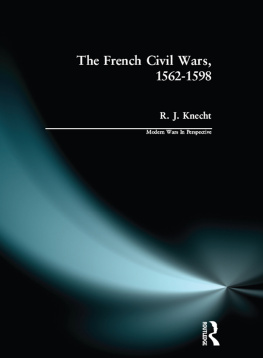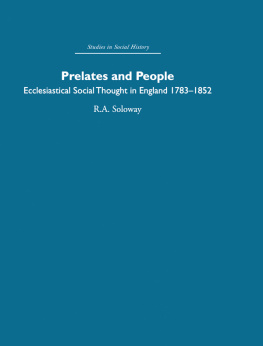French Renaissance Monarchy
French Renaissance Monarchy:
Francis I and Henry II
Second Edition
R. J. Knecht
First published 1984 by Pearson Education Limited Second edition 1996
Published 2014 by Routledge
2 Park Square, Milton Park, Abingdon, Oxon OX14 4RN
711 Third Avenue, New York, NY 10017, USA
Routledge is an imprint of the Taylor & Francis Group, an informa business
Copyright 1984, 1996, Taylor & Francis.
All rights reserved. No part of this book may be reprinted or reproduced or utilised in any form or by any electronic, mechanical, or other means, now known or hereafter invented, including photocopying and recording, or in any information storage or retrieval system, without permission in writing from the publishers.
Notices
Knowledge and best practice in this field are constantly changing. As new research and experience broaden our understanding, changes in research methods, professional practices, or medical treatment may become necessary.
Practitioners and researchers must always rely on their own experience and knowledge in evaluating and using any information, methods, compounds, or experiments described herein. In using such information or methods they should be mindful of their own safety and the safety of others, including parties for whom they have a professional responsibility.
To the fullest extent of the law, neither the Publisher nor the authors, contributors, or editors, assume any liability for any injury and/or damage to persons or property as a matter of products liability, negligence or otherwise, or from any use or operation of any methods, products, instructions, or ideas contained in the material herein.
ISBN 13: 978--0-582--28707-5 (pbk)
British Library Cataloguing-in-Publication Data
A catalogue record of this book is
available from the British Library
Library of Congress Cataloging-in-Publication Data
Knecht, R. J. (Robert Jean)
French Renaissance monarchy: Francis I and Henry II/R. J.
Knecht - 2nd ed.
p. cm. - (Seminar studies in history)
Includes bibliographical references and index.
ISBN 0 582 28707 3
1. Francis I. King of France, 14941547. 2. Henry II, King of
France, 1519-1559. 3. Monarchy-France-History-16th century.
4. France-Kings and rulers-Influence. 5. Valois. House of
Genealogy. I. Title. II. Series.
DC113.K584 1996
944'.028'0922-dc20
95-34669
CIP
Set by 7 in 10/12 Sabon
Such is the pace of historical enquiry in the modern world that there is an ever-widening gap between the specialist article or monograph, incorporating the results of current research, and general surveys, which inevitably become out of date. Seminar Studies in History are designed to bridge this gap. The books are written by experts in their field who are not only familiar with the latest research but have often contributed to it. They are frequently revised, in order to take account of new information and interpretations. They provide a selection of documents to illustrate major themes and provoke discussion, and also a guide to further reading. Their aim is to clarify complex issues without over-simplifying them, and to stimulate readers into deepening their knowledge and understanding of major themes and topics.
Readers should note that numbers in square brackets [] refer them to the corresponding entry in the Bibliography at the end of the book (specific page references are given in italic). A number in square brackets preceded by Doc. [ Doc. ] refers readers to the corresponding item in the Documents section which follows the main text. Words asterisked at first occurrence are defined in the Glossary.
The publishers would like to thank the following for permission to reproduce copyright material: Academie des Sciences Morales et Politiques for extracts from Ordonnances des Rois de France: Regne de Francois Ier 1936 and 1941 Vol V pp. 81-3 and Vol VII pp. 248-51; Yale University Press for an extract from The Monarchy of France by Claude de Seyssel, translated by J. H. Hexter, edited by D. R. Kelley, 1981; Phaidon Press Ltd for an extract from p. 125 of The Autobiography of Benvenuto Cellini edited and abridged by Charles Hope published in 1983.
In revising this book, I have taken note of important research done over the past decade. The chapter on the Sinews of War has been completely rewritten and that on the Kings as Patrons is new. A document has been added to illustrate this new chapter. The bibliography has been brought up to date.
R.J.K.
Birmingham, 1995

In 1515, when Francis I became king, France was still not a fully developed nation state. Signs of a national consciousness can be found in the writings of some contemporary scholars and also at a more popular level, yet France lacked well-defined frontiers, a common language and a unified legal system. Her eastern border was so blurred in places that some villagers living near it did not know whether they belonged to France or the Holy Roman Empire, a confusion which they happily exploited by evading taxes and the law. In so far as a frontier existed at all, it followed roughly the rivers Scheldt, Meuse, Sane and Rhone from the North Sea to the Mediterranean. People living west of this line were vassals of the French king; those to the east were subject to the emperor. French suzerainty over Artois and Flanders, however, was purely nominal, effective control of these areas having passed to the house of Burgundy. Further east, the frontier cut through the duchy of Bar, whose ruler, the duke of Lorraine, did homage for one half to the king of France, and for the other to the emperor. In the south, Dauphine and Provence were still not regarded as integral parts of the kingdom, as they were situated east of the Rhone: the king was obeyed as dauphin in the one and as count in the other. The south-west border of France more or less followed the Pyrenees, avoiding Roussillon, which belonged to Aragon, and the small kingdom of Navarre, ruled by the house of Albret. Within France, there were three foreign enclaves: Calais, which belonged to England, the Comtat-Venaissin, which belonged to the papacy, and the principality of Orange, which belonged to the house of Chalon. A few great fiefs also survived, notably the duchy of Brittany and the large Bourbon demesne in central France.
Linguistically, too, France was not fully unified by the start of the sixteenth century. Modern French is descended from langue d'o'tl south langue d'oc* was used. After 1450, however, as the French monarchy asserted its authority, following the expulsion of the English from Gascony, the langue d'oil began to make deep inroads in the south. The Parlements * of Toulouse, Bordeaux and Aix used it, and southern noblemen who took up offices at court adopted it. They continued to speak it when they returned home and communicated the habit to their servants. By 1515 the expansion of the French language southward was in full swing: only Gascony, Provence and a few smaller areas needed to be won over.










